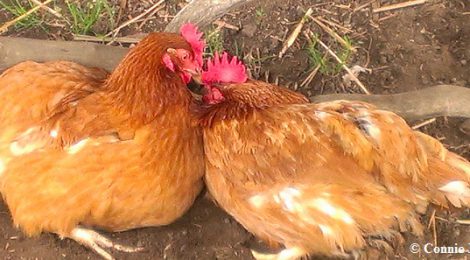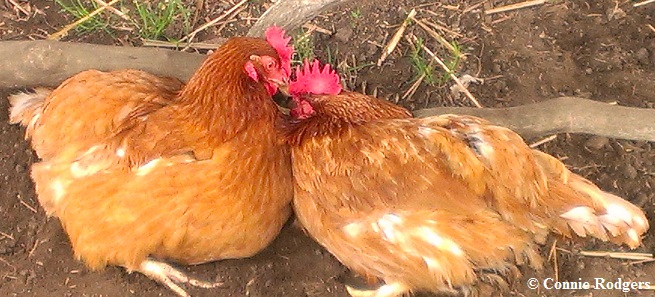
Tips on Taking Care of Rescued Spent Hens
As more people become aware of the cruelty of factory farming and the way animals are treated, there is a rise in people adopting or wanting to adopt rescued ex battery caged ‘spent’ laying hens. While offering spent hens the opportunity to finally be able to perform their natural behaviours is a worthy endeavour (in fact, CETFA has coordinated such rescues over the years! See for example our video Rescue 140), there should be special care given to these birds due to their genetic disposition and spending their lives in cages that people might not normally consider. We are providing the information below as a resource for current homes or potential future homes to raise awareness about the special care spent hens need, and help anyone who rescues spent hens from factory farms understand how to care for the animals and provide the best possible home for them.
Body Condition
Modern egg laying hens have been selectively bred to produce a very high number of eggs. As the commercial egg industry tries to get optimal egg laying performance from the hens, little care is given to the impact this has on their bodies. When egg laying hens are rescued, they are in very fragile condition. Generally, they are calcium depleted, have urine scalds on their rear ends, are missing feathers (some being totally bald), their beaks are chopped off (sometimes at incorrect and disproportionate angles) and their toes are overgrown and curled from living on wire cages their whole lives. They are severely dehydrated and their bodies are battered.
Unfortunately, the impact of battery cages is not just a physical one, it is an emotional one as well. Not knowing what to do with space once they have been rescued, the hens may cram together to a point it’s dangerous, especially when rescued in larger numbers (they run the risk of piling and suffocating). They are also extremely fearful at first and need time to learn how to trust people and feel secure in their environment. As they are unable to express any sort of natural behavior in the battery cages, their natural instincts are completely thwarted; they do not know how to express natural chicken behavior such as scratching and dust bathing.
The good news is, with proper care and nurturing, the hens will heal. In fact, many people who have adopted spent hens find it is a truly rewarding and fulfilling experience to watch them grow, physically and emotionally, discover their natural behavior and get a chance to ‘become chickens’. Slowly, the urine scalds disappear; the broken feathers begin to grow back; their feet take on a more normal appearance and they learn to wear their nails down naturally, through scratching. The only physical reminder of their days in the battery cages are their beaks, which never fully grow back and heal. They learn to trust people and they aren’t as fearful – they love to scratch, dust bathe and nest. They nourish their natural curiosity by exploring and love to peck for food.
Diet and Nutrition
Egg laying hens selectively bred to lay large quantities of eggs develop various reproductive problems and calcium deficiency. In many cases, the large number of eggs they lay is what leads to the problems that take their lives. To minimize the problems, it is important to provide the animals with diets that are well balanced. One of our adoptive homes suggests giving them un-medicated layer ration and adding cracked corn, rolled barley, oats molasses and flax (flax gives chickens their Omega 3’s) with a small sprinkling of oyster shells (to help provide calcium) once a day.
Another excellent source of calcium is cracking the hens’ own eggs and feeding them back to them – the hens typically love eating the yolk and egg shells! One of our adoptive homes suggests cooking the eggs before feeding them, as giving them raw eggs can sometimes lead to them starting to raid their own nests and breaking the eggs themselves, which can become very messy. In this case, the hens can be fed scrambled eggs with the crumbled shells up into it (allowing it to cool first), or entire hard boil eggs mashed up with a potato masher (mashing both the eggs and the shell together).
Grit is very important to help chickens digest their food. In the spring, summer and fall, the birds can peck at pebbles in the yard and may not need grit, but it’s always good practice to provide them with some regardless. In the winter, providing a bowl of grit becomes essential, since the animals won’t be able to get at the pebbles under the snow.
Treats can be something as simple as table scraps of fruits (berries, cantaloupes and watermelons) and veggies (such as romaine lettuce and bits of fruit-all chopped into small pieces for them to peck, of course) as well as rice. Cantaloupes and watermelons are also used by the birds to keep hydrated on a hot day. It is however never good to give them bits of onions, potatoes or citrus fruits.
Environment
The hens need an environment that is safe and secure for them as they grow. Remember when they are first rescued, they don’t know how to exhibit natural behaviors and are extremely fearful. Up until their rescue the contact they’ve had with humans has been little to none and an unpleasant experience. On factory farms, hens are moved and picked up by carrying them upside down by their feet and are handled roughly and violently.
If you are rescuing a larger number of birds (30 plus), it is best to put them into smaller groups (10 if possible) so they don’t hurt themselves in case they pile. There should be nothing on the floor the hens can wedge themselves into or under– we have seen this before with recently rescued birds, especially in larger numbers. They are so fearful they wedge themselves into nooks and crannies and end up getting stuck. We recommend putting them in a setting that is quiet and then as they get more comfortable slowly introducing them to new sights and sounds. Many homes where the hens have thrived have reported talking softly and moving slowly around them at first to get them used to human contact.
If you are rescuing in the winter or colder months, a heat lamp or heating system will be required to make sure they have proper heat (due to the feather loss and being in an atmosphere controlled barn, this is essential until they start getting their health back). Heat bulbs work well but you must be extremely careful with them as they have been the cause of far too many fires. Buy good ones from a farm supply business. They are best kept up high (so the hens don’t run/fly into them and they don’t toss wood shavings on them while scratching or dust bathing), hung safely away from anything flammable (shavings, wood walls, bags…) and dusted off every day. Check often to ensure that the bulbs are secured and haven’t loosened.
Hens should also be provided with proper bedding. Their rooms should be cleaned out lightly every day (poop picked up & bedding fluffed to prevent packing which can harm hens’ feet & legs when landing on it) and thoroughly cleaned every few months to prevent infestation from mites…which can kill the birds.
As hens are extremely vulnerable to predators, proper predator proof fencing and housing is required at all times. We cannot stress enough how important this is. When they feel comfortable and secure in their new environment inside, they can start exploring outside. In a safely secured area, the hens should be allowed to go outside – never let them wander off alone. Remember that because of the system in which these hens were raised, they have not developed natural predator instincts so they need to be protected at all times.
Of course, food and water should be available to them at all times and easily accessible. When they are first rescued it is a good idea to have extra food and water dishes out and make sure everyone gets a drink; in the days prior to slaughter, barns usually turn off all food and water systems, so at time of rescue they are dehydrated and malnourished. Pedia Lyte is sold at local drug stores and good to give them when they are first rescued as it will help keep them hydrated and restore electrolyes; a bit can be added to their water to ensure all the hens get some. If a hen looks extremely fragile and dehydrated, it is best to put her in a carrier or separate pen by herself for a while so she can recover and has full access to food and water. The same thing goes for hens with slightly prolapsed uteruses – they should be separated with full access to food and water and given time to heal. If this condition does not heal or she appears to be in pain, please consult with your vet– if the condition is not treatable and she is in pain, it is best to give animals a humane euthanasia rather than let them live in constant pain and suffering.
Care
Hens should be handled and approached softly and gently. When picking them up, they should never be picked up and hung upside down; the utmost care and respect should be given to these delicate animals who may have been injured during handling and/or transport. For instance, while being yanked from their battery cages and hung upside down before being loaded onto trucks, some hens will end up with broken legs. Immediate consultation with a veterinarian should be taken and pain meds administered; we are happy to report chickens with broken legs are capable of making full recoveries and leading happy, healthy lives. Please note that finding a veterinarian close enough and who knows birds can be difficult but is vital so plan ahead before adopting.
Resources
Before rescuing and adopting hens, make sure to plan ahead and do research into all of the issues aforementioned to save both yourself and the birds a lot of stress and suffering later and be fully prepared.
Farm animal sanctuaries and chicken specific rescue groups (such as Chicken Run Rescue) are a fabulous source of information. The best thing to do if you have a question is to look on their website and see if you can find the answer to your question. If you can’t find the information you are looking for, send them an email and see if they can help you. It is best to ask questions and talk to people with experience rescuing hens because they can give you tips which can be very valuable.



